Most pastors are expecting one of their largest crowds on Easter, but those expectations have tempered some in the past decade.
The three highest-attendance Sundays for pastors—Easter, Christmas and Mother’s Day—have remained the same since 2011, but each is now less likely to be among the top days, according to a Lifeway Research study of U.S. Protestant pastors.
“While many churches consider high attendance as something from their pre-pandemic past, seasonal changes have resumed,” said Scott McConnell, executive director of Lifeway Research. “Church attendance is predictable again with periods of consistency in the fall and early spring, as well as holiday crowds at Christmas and Easter.”
Today, 90% of pastors identify Easter as the day their church has its highest, second-highest or third-highest attendance for worship service. Four in 5 (81%) say the same for Christmas, and 51% identify Mother’s Day.
But fewer pastors point to high attendance on those three days compared to 2011. Easter, down from 93% to 90%, and Christmas, down from 84% to 81%, dropped three percentage points, while Mother’s Day fell eight points from 59% to 51%. A day the church designates to invite friends is the only day to have a statistically significant increase in the past decade, climbing from 14% in 2011 to 20% in 2024.
Your tax-deductible gift helps our journalists report the truth and hold Christian leaders and organizations accountable. Give a gift of $30 or more to The Roys Report this month, and you will receive a copy of “Hurt and Healed by the Church” by Ryan George. To donate, click here.
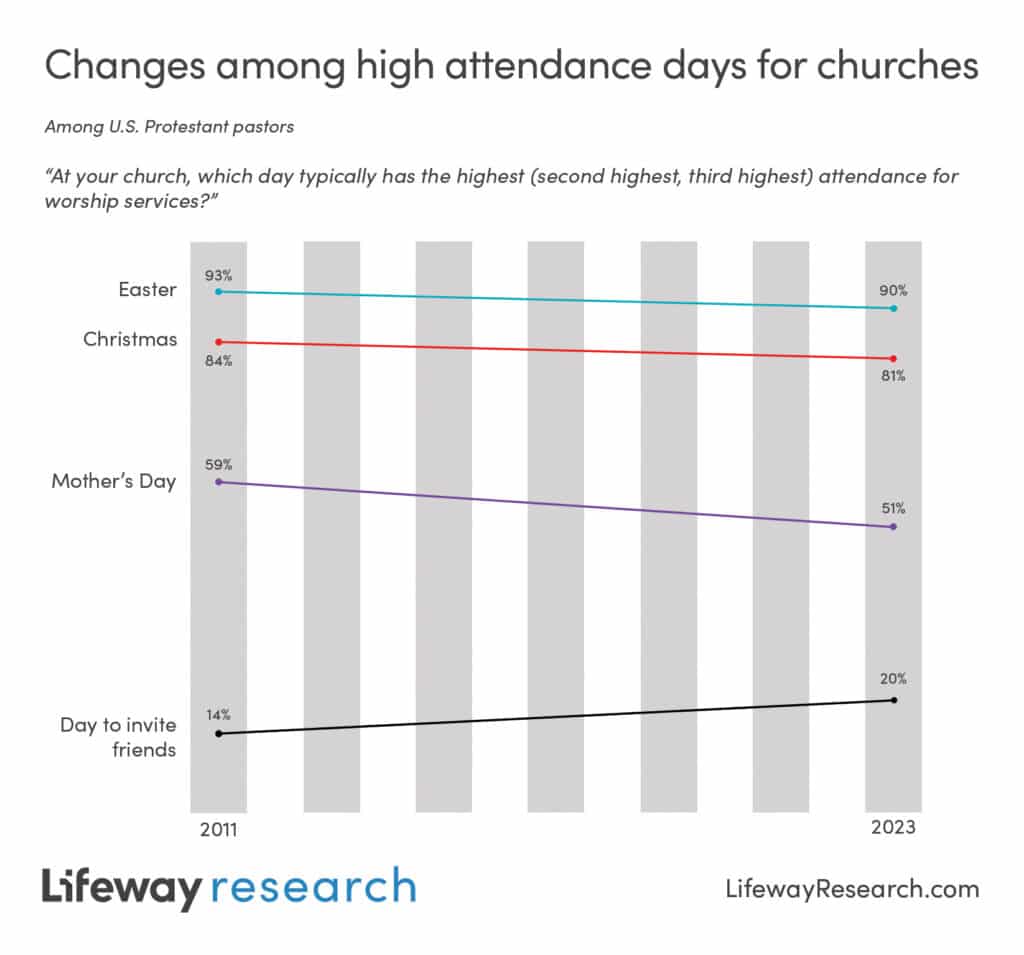
An additional study finds several of the top days for church attendance are among U.S. Protestant churchgoers’ favorite holidays to celebrate.
Easter Sunday gatherings
More than half of U.S. Protestant pastors (52%) identify Easter as the day their church typically has its highest attendance for worship services, statistically unchanged from the 55% who said the same in 2011. Another 30% say Easter is the second most attended day at their congregation, while 8% identify it as the third-highest-attendance worship service.
“On any given Sunday, a large minority of a congregation may not be present for worship,” said McConnell. “Easter is the day when the most church members get to church—and for a good reason: No other theme is as profound to a Christian than celebrating that they died with Christ and as Jesus was raised to life, so too Christians are now alive to God in Christ Jesus.”
Pastors of churches that top 100 attendees are more likely than small church pastors to say Easter is one of the highest attended services, if not the highest, at their churches. Those at churches with 250 or more for an average weekend worship service (67%) and those with 100 to 249 (60%) are more likely than pastors at churches with 50 to 99 on average (51%) and those with fewer than 50 (44%) to say Easter is their highest-attendance service of the year. Additionally, those at churches that average 100-249 for worship services (93%) and those at churches with 250 or more (98%) are more likely than pastors of churches with attendance of less than 50 (87%) to rank Easter in their top three high-attendance days.

Non-denominational pastors are more likely than Presbyterian/Reformed pastors to have their largest crowds on Easter (64% v. 45%). Also, Lutherans (98%) and Methodists (95%) are more likely to have Easter near the top than Presbyterian/Reformed (87%), Pentecostal (84) or Restorationist Movement pastors (78%).
Among churchgoers, Easter ranks third among their favorite holidays to celebrate (10%). Those who attend worship services at least four times a month are more likely than those who attend one to three times a month to pick Easter (14% v. 5%). Also, churchgoers with evangelical beliefs are more likely than those without to choose the celebration of Jesus’ resurrection (13% v. 6%).
Christmas crowds
Perhaps unsurprisingly, U.S. Protestant pastors say Christmas is also one of their most well-attended services. More than a quarter (28%) say they typically have their highest attendance for worship services as they celebrate the birth of Jesus, statistically unchanged from 29% in 2011. Around 2 in 5 (39%) point to Christmas as the second in their attendance rankings, while 14% place it third.
“Pastors may have been thinking of different types of worship services for Christmas since the question did not specify a Sunday morning or weekend worship service,” said McConnell. “Different churches have different traditional Christmas celebrations that may not land on December 25. The largest attendance may be on Christmas Eve, the nearest Sunday or the day of a concert.”
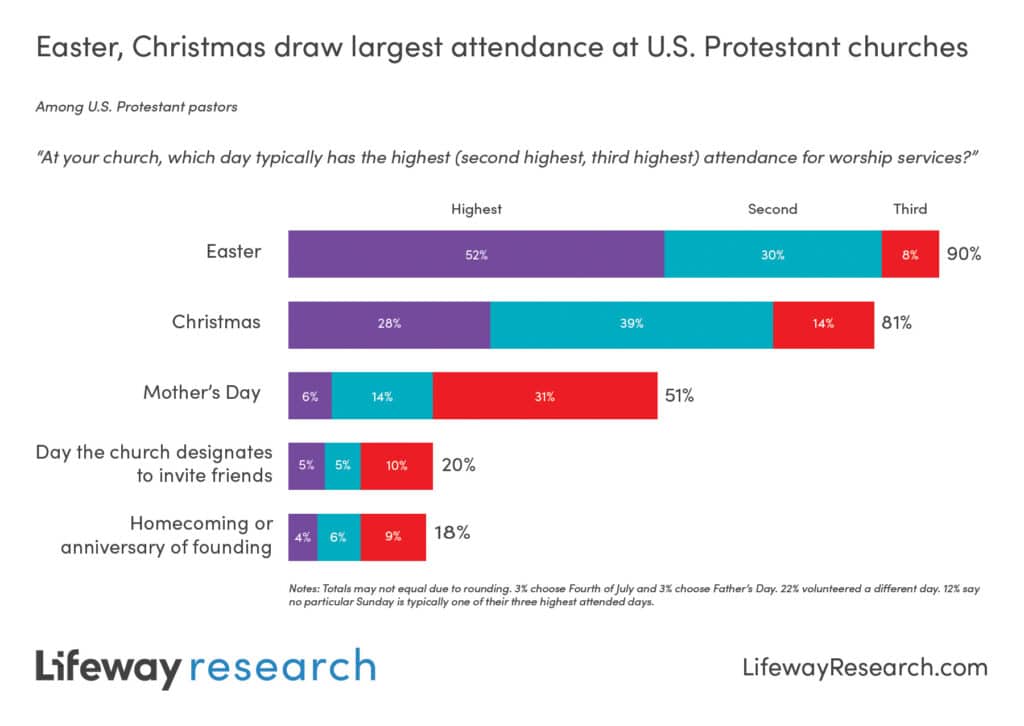
Mainline pastors are more likely than their evangelical counterparts to identify Christmas as their best-attended service (35% v. 26%). Protestant pastors in the Northeast are also more likely than those in the South to have Christmas at the top of their attendance rankings (33% v. 24%).
Additionally, pastors in the Midwest are more likely than those in the South to have Christmas in their top three (84% vs. 78%). The largest churches, those 250 or more, are more likely than the smallest churches, fewer than 50 in attendance, to say Christmas is one of their three most well-attended services (89% v. 79%).
Christmas is by far the favorite holiday of Protestant churchgoers (63%), but those at the smallest churches are least likely to agree. Those attending churches with weekly worship services that average 500 or more (69%), 100 to 249 (69%) and 50 to 99 (63%) are more likely than those at churches with fewer than 50 (53%) to say Christmas is their favorite holiday to celebrate.
Mother’s Day visits
While pastors identify Christmas and Easter as far and away their highest-attendance seasons, Mother’s Day remains the clear third, despite dropping in popularity in the past decade. Few Protestant pastors say Mother’s Day is their highest (6%) or second-highest attendance day (14%), but a plurality (31%) point to the holiday as their third highest.
African American pastors are more likely than white pastors to say they have their highest attendance for a Mother’s Day service (12% v. 5%). They are also more likely than white pastors to rank the holiday in their top three (66% v. 49%). Additionally, pastors 65 and older (55%) are among the most likely to say Mother’s Day is one of their three highest attendance services.
Non-denominational pastors (64%), Baptists (59%), Restorationist Movement pastors (59%) and Pentecostals (54%) are more likely than Presbyterian/Reformed (39%) and Lutheran pastors (30%) to place Mother’s Day in their top three.
Other days
U.S. Protestant pastors say the other days that make their three highest-attendance services include a day the church designates to invite friends (20%), homecoming or anniversary of the church’s founding (18%), Fourth of July (3%) and Father’s Day (3%). Around 1 in 8 say part of their top three includes no particular Sunday (12%).
Around a quarter of pastors (22%) said another specific day. The top choices offered among those included Thanksgiving, Palm Sunday, a baptism service, Reformation Day, Confirmation Sunday, Christmas Eve and All Saints Day. Each of those had fewer than 3% mention them.
The special day to invite friends is the only day that saw significant growth since 2011, with 20% of pastors now including it in their top three, compared to 14% in 2011. The special friend day is more popular in the Northeast (29%) than the Midwest (18%) and South (17%). Pentecostals (32%) are among the most likely to include this as part of their three highest-attended services. Pastors at churches with an average attendance of 250 or more are among the least likely (11%).

“Only the most visible church in the community is likely to get visitors who simply appear at church on Christian holidays,” said McConnell. “People who don’t think of themselves as Christians or who do not have a church typically need a personal invitation before they will show up at a church. Many are open to these invitations, as evidenced by higher attendance when they are emphasized.”
Large churches are also among the least likely to say homecoming or the anniversary of the church’s founding is one of their most popular services (8%). For African American (33%) and Baptist pastors (28%), however, this is more likely to be among their top three attended services.
U.S. Protestant churchgoers also have clear favorite holidays to celebrate, whether that includes a visit to church or not. Christmas (63%) and Easter (10%), along with Thanksgiving (14%) are the most popular holidays among churchgoers, followed by Halloween (4%), New Year’s Eve and Day (3%) and Independence Day (3%). Fewer choose Memorial Day (1%), Labor Day (1%), Juneteenth (1%), Columbus Day (<1%) and Martin Luther King, Jr. Day (<1%), while 2% say they’re not sure.
Aaron Earls is the senior writer at Lifeway Research.




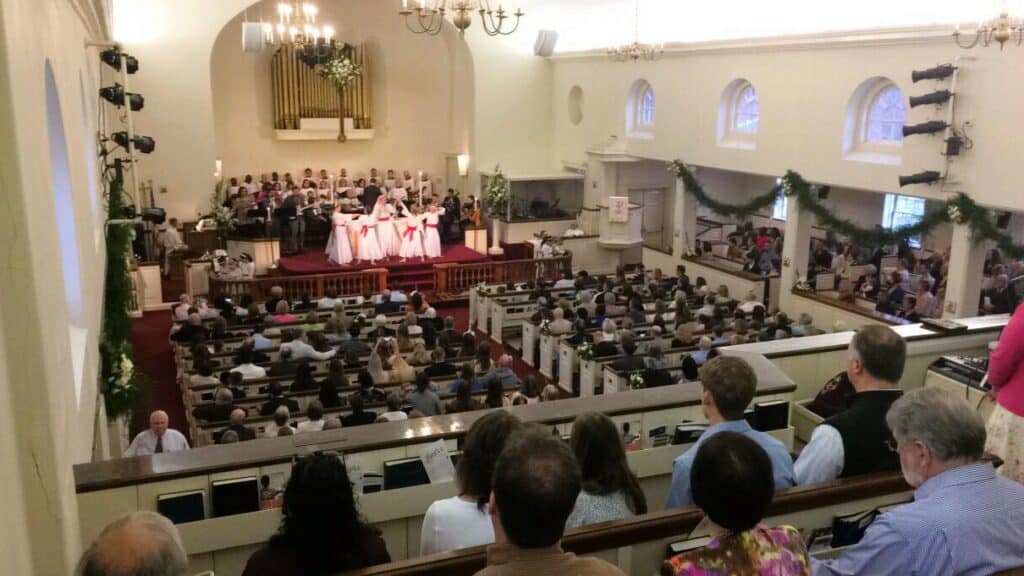

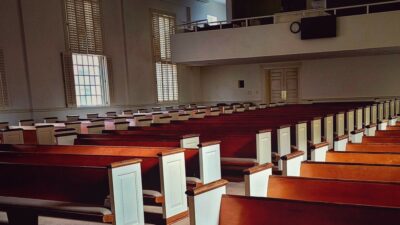


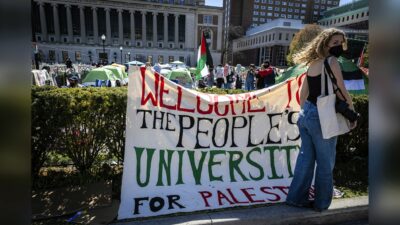


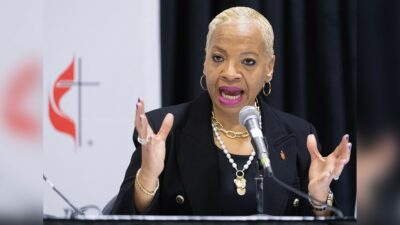







7 Responses
Yea…..all statistically significant numbers, maybe. One issue though. But, who told Christians to celebrate all these pagan derived holidays? Because it sure isn’t scriptural nor was it commanded in the scripture (save for the communion)
Ancient Israel BCE celebrated Passover to commemorate exodus (salvation) from Egyptian bondage; which was a type and shadow for Yeshua’s work of atonement for our sins. Yeshua celebrated Passover right before HIS crucifixion. The apostles, early believers & Jews C.E celebrated Passover to commemorate Yeshua’s death and resurrection. That is until the Roman’s ruined it.
So I ask again, who told Christians to celebrate these non-biblically prescribed holidays? Traditions?
See, what happens when the state government tries to force religion upon people?
You end up with man-made traditions, doctrines and syncretism like Easter, Christmas etc…. Well done Emperor Constantine of Rome. For YHVH will judge all those who have changed HIS ordinances, corrupted HIS times and seasons and forsaken HIS commandments in favour of man-made ones.
Western Christo-politicians take note. Nationalists Christians take heed. True believers beware. Learn from history, else it’s bound to repeat.
Devarim (Deut) 12:4, 29- 32 “take heed that you do not follow after the customs and manner of the heathen (pagan) nations in how they serve their gods…..you shall not worship me as they do”.
Who cares? Christians have celebrated Easter for over 1700 years and Christmas for over 1500 years.
What good would it do to abandon centuries of traditional observance and pick other dates/anniversaries that I can 100% guarantee there would be no consensus on? You’re only going to get more division and divisiveness, not less.
It’s really the height of pedantry to complain about such things these days, and benefits no one.
“Who cares? Christians have celebrated Easter for over 1700 years and Christmas for over 1500 years.”
God. When we elevate an imaginary elf or rabbit to children above the true meaning and purpose of these celebrations, we are not celebrating God. It’s is not complaining, but if we do not acknowledge the truth of what we are engaging in, and if the focus is on anything other than the Birth of Jesus and His resurrection, we are worshiping false idols that bring gifts.
Sir, surely you jest. Deuteronomy 12-“you shall not copy pagan ways” is evidently not enough?.
Did you know: Ancient kingdom of Israel split, met their utter destruction and subsequent dispersion as a result of secondary (acquired) idolatry from syncretism? How? By adopting, mixing with pagan customs thereby changing, profaning and violating YHVH’s ordinances. See 1 kings 11, 12 for starters.
The church is not destroyed today like Israel was because of “age of gentiles= age of grace” period. Nevertheless, the judgement still awaits for the day of reckoning in the latter end; Isaiah 24:1-5 assures this.
Syncretism is mixing truth with falsehood. YHVH abhors such mixtures, and this can be seen in HIS various commands. See Deuteronomy 22:9-11. Paul would later say, of what concord has light with dark?
Insisting on upholding traditions of man against YHVH’s commandments is rebellion, and pride. Yeshua rebuked the Pharisees for this very reason.
Christianity’s syncretism is found in celebrations of Easter (lent), Christmas and Sunday as Sabbath. These three are the major ones; there are many more. The church is grafted into Israel, ought they not to keep the applicable laws of YHVH?
Book of Revelation says Yeshua returns for those who keep HIS testimony AND commandments. Do not be found guilty of the sin of presumption because you excused violation of HIS commands.
More scripture references for Israel’s syncretism and their ultimate destruction and dispersion: 1 Kings 11, & 12; Ezekiel 20:12-13, Ezekiel 22: 8, 31, Nehemiah 13:18, Jeremiah 17:27).
I big to differ.
For starters, Paul himself said in Colossians 2 regarding the Holy Days. Second, Christ himself is the Lord of the Sabbath. Second, Christians meeting on Sunday occurred very early on (even when the Apostles were still alive). See Acts 20:7 and 1 Corinthians 16:2 for starters. Sunday is called the Lord’s Day (per Rev 1:10) since it was the day Christ was resurrected.
You fail to understand that EVERYTHING in Scriptures both OT and NT must be viewed through the lens of Christ. I find a number of your comments coming dangerously close to the error of the Judaizers. Of which, the NT had a number of choice words for them. Paul’s rebuke of Peter is classic case of refutation of the Judaizers.
One example clearly negates your argument. Circumcision. Of the OT commands of YHVH is that all males must be circumsised. It is clear that Gentile converts need not do as the writings in the NT indicate. Read the book of Galatians.
“You fail to understand that EVERYTHING in Scriptures both OT and NT must be viewed through the lens of Christ. I find a number of your comments coming dangerously close to the error of the Judaizers. Of which, the NT had a number of choice words for them. Paul’s rebuke of Peter is classic case of refutation of the Judaizers.”
And yet, you use the words of a man, not Christ, to prove your point.
The surges of attendance on C&E are as much cultural, familial, and social as religious. The “extra” people in services last night (Saturday) and today (Sunday) probably weren’t in that edifice last week nor will they be there next week. Some are visiting families and friends (like we normally do with our daughter and her family). Most are likely non-observant people who have heard the Gospel numerous times and rejected it or possibly accepted it once long ago and have since left it behind. Catholics have their Holy Days of Obligation, but every Sunday is considered one including Resurrection Sunday. Christmas is another. My dad, who was a “not very observant Catholic” until late in life, referred to them as C&Eers because they would crowd the services on C&E and not be seen again until a funeral or wedding.